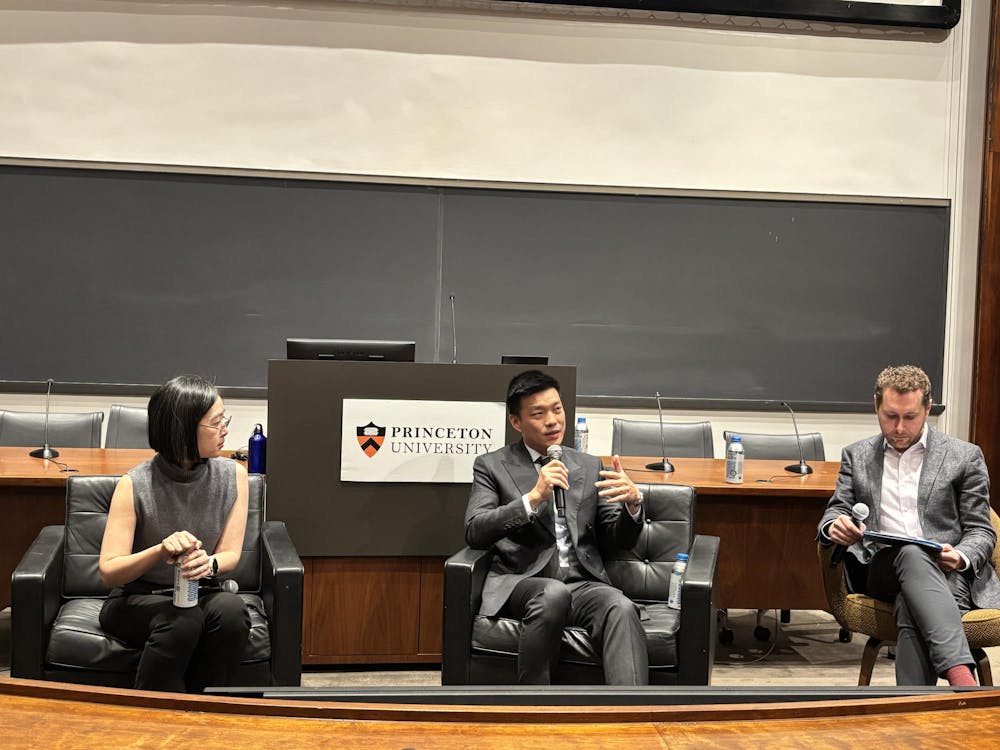Thai pro-democracy figures Natthaphong Ruengpanyawut and Kunthida Rungruengkiat GS spoke on Wednesday at the U.S. premiere of “Breaking the Cycle,” a documentary on the rise and suppression of Thailand’s modern reform movement.
The event was hosted by Thaigers, the Thai Students’ Association on campus and sponsored by the Liechtenstein Institute on Self-Determination.
Directed by Aekaphong Saransate and Thankrit Duangmaneeporn, “Breaking the Cycle” traces the ascent of the pro-democracy Future Forward Party (FFP) and its founder Thanathorn Juangroongruangkit from the 2019 Thailand election through subsequent court-ordered dissolutions of both FFP and its successor, Move Forward.
The film premiered at the Hot Docs Canadian International Documentary Festival before opening in Thailand.
Thailand has experienced 13 military coups and has had 20 constitutions since its modern political system was established after the Siamese Revolution of 1932. The FFP pushed to introduce constitutional reforms to reduce the institutionalized power of the military and end the cycle of coups.
Ruengpanyawut, the current leader of the Opposition in the Thai Parliament, spoke about the challenges of representing a young, idealistic movement. He said, “I don’t think that ideology and pragmatism should be balanc[ed] … we can do it in parallel.”
He shared an anecdote about how in his election for Parliament, it was initially reported that he had narrowly lost. However, he challenged the results, and the district elections office found that it had miscounted, making him the actual winner. The lesson he took away was, “If you keep fighting, keep asking, a more correct system can happen.”
Rungruengkiat, the former Deputy Leader of the FFP and the Director at the Progressive Movement Foundation, discussed the challenges of coupling social media popularity with on-the-ground momentum. One initiative she ran to foster enthusiasm was hosting a “Hackathon” where regular people were encouraged to “dissect the national budget together” to “flip the idea that it’s just legislative work.” She explained that she hopes these initiatives will help people “feel empowered” because “our enemy is hopelessness.”

Visiting School of Public and International Affairs Professor Eduardo Bhatia ’86, who spoke at the event, framed Thailand’s experience as an example of “lawfare,” using courts and administrative tools to sideline opponents.
“Democracies are under assault … by incremental capture by those who use the required institutions to slowly suffocate democracy itself,” Bhatia said, drawing parallels from Hungary to El Salvador and noting related dynamics in the United States.
Bhatia believes that one takeaway from the FFP’s movement is the vision of young people.
“When young people believe that the future belongs to them,” Bhatia shared, “democracy revives.”

Penrung Tedvirat, a Thai immigrant who recently arrived in Princeton, first learned about the documentary premiere through a Thaigers Facebook post. Tedvirat voted for Ruengpanyawut and said it was important to support her candidate by showing up at Wednesday’s screening. “[Ruengpanyawut] can make the country better. He can make a new home for a new generation of young people,” Tedvirat said. “And definitely, no more soldiers.”
Members of the Princeton community expressed that the screening offered insight into Southeast Asian politics, a perspective several students noted was usually left out of campus discussions on global events. Victoria Koretsky ’26 explained that she first learned about the premiere through a flyer sent in the Princeton Filipino Community group chat. “They were like, ‘Let’s go support our Southeast Asian friends!’” Koretsky told The Daily Princetonian.
Mai Kasemsawade ’26, president of the Thaigers, shared that the lack of precedent for Southeast Asian affinity groups hosting events of this scale was a major obstacle in the planning process. “It’s been hard for my group to get funding because you don’t know where to ask,” Kasemsawade said.
Kasemsawade added that events like this one were crucial in allowing students to meaningfully discuss events abroad. “Most of the events I’ve seen for Southeast Asian and other cultural affinity groups are related to culture, which is important,” Kasemsawade said. “Another really important side, which is sensitive for some countries, is the political dynamics within a country.”
Kasemsawade added that Wednesday’s documentary premiere was the largest-scale event the Thaigers hosted in recent memory, a feat she hopes to repeat.
Oliver Wu is a News contributor for the ‘Prince.’ He is from Stony Brook, N.Y. and can be reached at oliver.wu[at]princeton.edu.
Teresa Chen is a News contributor from Shanghai, China. She can be reached at tc7069[at]princeton.edu.
Please send any corrections to corrections[at]dailyprincetonian.com.








